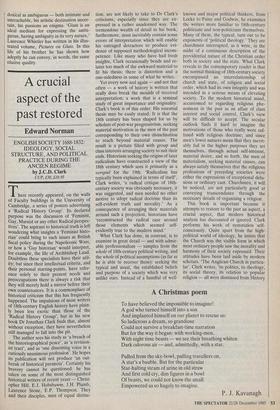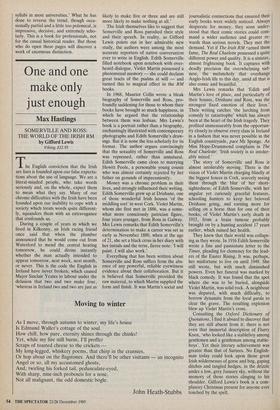A crucial aspect of the past restored
Edward Norman
ENGLISH SOCIETY 1688-1832: IDEOLOGY, SOCIAL STRUCTURE, AND POLITICAL PRACTICE DURING THE ANCIEN REGIME by J.C.D. Clark
CUP, BD, f10.95
There recently appeared, on the walls of Faculty buildings in the University of Cambridge, a series of posters advertising a `Radical History Group'. Its declared purpose was the discussion of 'Feminist, Gay, Marxist or any other Radical perspec- tives'. The aspirant to historical truth is left wondering what insights a 'Feminist histo- nan' could bring to such issues as British fiscal policy during the Napoleonic Wars, or how a `Gay historian' would interpret, for example, the life of Archbishop Laud. Doubtless these specialists have their util- ity; but since their intellectual criteria, and their personal starting-points, have refer- ence solely to their present needs and preoccupations there is always a risk that they will merely hold a mirror before their own countenances. It is a commonplace of historical criticism that this has frequently happened. The impulsions of most writers of 18th-century English history have plain- ly been less exotic than those of the `Radical History Group', but in his new book Dr Jonathan Clark finds that, almost without exception, they have nevertheless still managed to fall into the pit. The author sees his study as 'a breach of the historiographical peace', as 'a revision- ist tract', and as 'one dissenting voice in a curiously unanimous profession'. He hopes its publication will not produce `an out- break of historical paranoia'. Certainly his bravery cannot be questioned: he has taken on some of the most distinguished historical writers of recent years — Christ- opher Hill, E.J. Hobsbawm, J.H. Plumb, Laurence Stone, E.P. Thompson. They and their disciples, men of equal distinc- tion, are not likely to take to Dr Clark's criticisms, especially since they are ex- pressed in a rather unadorned way. The tremendous wealth of detail in his book, furthermore, must inevitably contain some errors of interpretation which will enable his outraged detractors to produce evi- dence of supposed methodological incom- petence. Like many who have had fresh insights, Clark occasionally bends and re- lates too much of the awkward material to fit his thesis; there is distortion and a one-sidedness in some of what he writes.
Yet every now and again — and not that often — a work of history is written that really does break the moulds of received interpretation; a work that is a seminal study of great importance and originality. Clark's book is of this order. His essential thesis may be easily stated. It is that the 18th century has been shaped for us by scholars of post-war progressivism, seeking material motivation in the men of the past corresponding to their own disinclination to reach beyond material causes. The result is a picture filled with group and class interests arranging society to suit their ends. Historians seeking the origins of later radicalism have constructed a view of the 18th century which sees it primarily as a vorspiel for the 19th. 'Radicalism has typically been explained in terms of itself , Clark writes, 'a radical critique of 18th- century society was obviously necessary, it was suggested, and men needed no other motive to adopt radical doctrine than its self-evident truth and morality.' As a consequence of arranging their materials around such a projection, historians have `reconstructed the radical case around those elements which seemed self- evidently true to the modern mind.'
What Clark has done, in contrast, is to examine in great detail — and with admir- able professionalism — samples from the whole of 18th-century political writing, and the whole of political assumptions (as far as he is able to recover them): seeking the typical and usual, the established beliefs and purpose of a society which was very unlike ours. Instead of a handful of well- known and major political thinkers, from Locke to Paine and Godwin, he examines the writers more familiar to 18th-century politicians and non-politicians themselves. Many of them, the typical, turn out to be exponents of 'political theology.' They are churchmen interrupted, as it were, in the midst of a continuous description of the providential nature of the Christian order both in society and the state. What Clark reveals to the contemporary reader is that the normal thinking of 18th-century society encompassed an interrelationship of church and state, of religion and social order, which had its own integrity and was intended as a serious means of elevating society. To the modern historical mind, accustomed to regarding religious phe- nomena in the past as an affair of class interest and social control, Clark's view will be difficult to accept. The secular outlook finds it hard to imagine the motivations of those who really were suf- fused with religious doctrine; and since men's lower natures mean that they inevit- ably fail in the higher purposes they set themselves, through actual self-interest, material desire, and so forth, the men of materialism, seeking material causes, can always satisfy themselves that the religious professions of preceding societies were either the expressions of exceptional delu- sions or ordinary cant. Churchmen, it will be noticed, are not particularly good at conveying transcendance through the necessary details of organising a religion.
This book is important because it attempts to restore to the past an aspect, a crucial aspect, that modern historical analysis has discounted or ignored. Clark performs his work of restoration self- consciously. Quite apart from the high- political world of ideology, he insists that the Church was the visible form in which most ordinary people saw the morality and harmony of their society expressed. Their attitudes have been laid aside by modern scholars. `The Anglican Church in particu- lar', Clark writes, 'its politics, its theology, its social theory, its relation to popular religion — all were dismissed from History syllabi in most universities.' What he has done to reverse the trend, though occa- sionally partial and a little too polemical, is impressive, decisive, and extremely scho- larly. This is a book for professionals, not for the casual historical reader. But those who do open these pages will discover a work of enormous distinction.



















































































 Previous page
Previous page